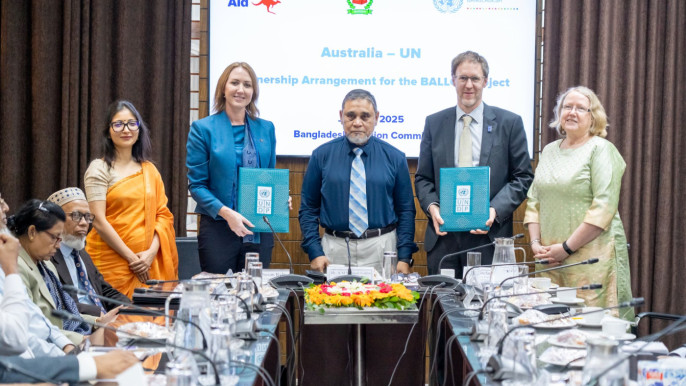Diplomatic Correspondent
Published:2025-06-18 23:50:37 BdST
Australia to give AUS$ 2mn to support Bangladesh's electoral process
Australia will contribute AUS$ 2 million to support Bangladesh in holding a transparent, inclusive, and peaceful national election.
This funding will complement the US$ 18.53 million BALLOT project, which is being implemented by the Election Commission (EC) with financing from the United Nations Development Programme (UNDP).
To formalise the support, the Australian High Commission and the United Nations signed an agreement today, making Australia the first development partner to assist the BALLOT Project, which aims to strengthen Bangladesh's electoral process.
Australian High Commissioner in Dhaka, Susan Ryle and UNDP Bangladesh Resident Representative, Stefan Liller, put pen to paper in the presence of Chief Election Commissioner AMM Nasir Uddin, at the Election Commission Secretariat here in the capital.
EC senior secretary Akhtar Ahmed, UNESCO Country Representative Dr. Susan Vize and UN Women Deputy Representative Navanita Sinha were, among others, were present.
Regarding the project, Akhtar Ahmed said, "Since the formation of the EC, we have been seeking support from the UNDP. They have supported us from the outset, and under the ballot project, a total of $18.53 million will be provided. Australia has pledged 2 million dollars in their own currency."
He said, "There are 16 components related to the election. UNDP has discussed funding for these 16 components. Among them, Australia has committed to providing 2 million dollars in assistance."
He added, "We hope to receive support from other donors for future financing of this project. The project will run until 31 December, 2027."
The EC senior secretary further said, under this project, it will be implemented across 16 major components, including capacity building, awareness, training, and institutional framework. "We hope for the best utilisation of this."
Akhtar Ahmed continued, "In the initial stages of the voter registration process, they supported us with laptops, scanners, cameras, and office machines. In continuation of that support, an MoU for this project was signed today."
The project is a three-year-long joint initiative being implemented by UNDP Bangladesh, UNDP, UN Women, and UNESCO to assist Bangladesh ahead of a national election.
The BALLOT Project aims to strengthen the institutional capacity of the Bangladesh Election Commission, support the planning and implementation of an inclusive and peaceful electoral process, and promote informed civic engagement.
This includes targeted civic and voter education campaigns for vulnerable groups, including women, youth, minorities, persons with disabilities, elderly voters and first-time voters.
Australian High Commissioner to Bangladesh Susan Ryle said, "Australia supports Bangladesh on its pathway to democratic elections. We are pleased to announce that we will contribute AUS$ 2 million to support the Bangladesh Election Commission's BALLOT Project in partnership with the United Nations."
UNDP Resident Representative Stefan Liller said the BALLOT Project reflects the United Nations' strong and ongoing commitment to support democratic governance in Bangladesh.
"Australia's leadership in becoming the first funding partner to support the BALLOT Project is a vital step in ensuring a credible, inclusive, and transparent electoral process," he said.
The BALLOT Project places strong emphasis on enhancing women's participation, not only as voters but also as candidates, polling officials, observers, and party agents.
Additionally, it includes a dedicated component on media and elections, supporting freedom of expression, journalist safety, and countering misinformation and disinformation during the electoral period.
On 28 May last, the Economic Relatiojns Division (ERD), the Election Commission and UNDP signed an agreement to launch the "BALLOT" project.
Unauthorized use or reproduction of The Finance Today content for commercial purposes is strictly prohibited.


